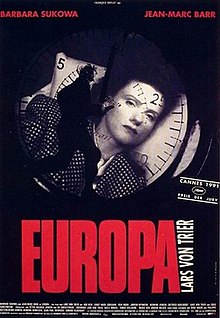fiction.wikisort.org - Movie
Europa (known as Zentropa in North America) is a 1991 experimental political psychological drama film[5][6] directed by Lars von Trier. It is von Trier's third theatrical feature film and the final film in his Europa trilogy following The Element of Crime (1984) and Epidemic (1987).[7]
| Europa | |
|---|---|
 Film poster | |
| Directed by | Lars von Trier |
| Written by |
|
| Produced by |
|
| Starring | |
| Cinematography |
|
| Edited by | Hervé Schneid |
| Music by | Joachim Holbek |
Production companies |
|
| Distributed by | Nordisk Film Biografdistribution |
Release dates |
|
Running time | 114 minutes[3] |
| Countries |
|
| Languages |
|
| Budget |
|
| Box office | $1 million[4] |
The film features an international ensemble cast, including French-American Jean-Marc Barr, Germans Barbara Sukowa and Udo Kier, expatriate American Eddie Constantine, and Swedes Max von Sydow and Ernst-Hugo Järegård.
Europa was influenced by Franz Kafka's Amerika, and the title was chosen "as an echo" of that novel.[8]
Plot
A young, idealistic American hopes to "show some kindness" to the German people soon after the end of World War II. In US-occupied Germany, he takes on work as a sleeping-car conductor for the Zentropa railway network, falls in love with a femme fatale, and becomes embroiled in a pro-Nazi terrorist conspiracy.
Cast
- Max von Sydow as the Narrator
- Jean-Marc Barr as Leopold Kessler
- Barbara Sukowa as Katharina Hartmann
- Udo Kier as Lawrence Hartmann
- Ernst-Hugo Järegård as Uncle Kessler
- Henning Jensen as Siggy
- Erik Mørk as Pater
- Eddie Constantine as Colonel Harris
- Jørgen Reenberg as Max Hartmann
- Benny Poulsen as Steleman
- Erno Müller as Heifer
- Michael Phillip Simpson as Robins
- Holger Perfort as Mr. Ravenstein
- Anne Werner Thomsen as Mrs. Ravenstein
- Lars von Trier as Jew
- Baard Owe as Man with papers
Style

Europa employs an experimental style of cinema, combining largely black and white visuals with occasional intrusions of colour, having actors interact with rear-projected footage, and layering different images over one another to surreal effect. The voice-over narration uses an unconventional second-person narrative imitative of a hypnotist (e.g. "On the count of ten, you will be in Europa.").
The film's characters, music, dialogue, and plot are self-consciously melodramatic and ironically imitative of film noir conventions.
Production
The film was shot throughout Poland (Chojna Cathedral (Marienkirche) and the Chojna Roundhouse) and in Denmark (Nordisk Film studios, Copenhagen and the Copenhagen Dansk Hydraulisk Institut)
Von Trier's production company, Zentropa Entertainments, is named after the sinister railway network featured in this film, which is in turn named after the real-life train company Mitropa.
Reception
Europa was released as Zentropa in North America to avoid confusion with Europa Europa (1990).
Critical reception
This section needs expansion. You can help by adding to it. (February 2016) |
The film received largely positive reviews from critics. Review aggregator website Rotten Tomatoes reports an 85% score based on 13 reviews, with an average rating of 7.3/10.[9]
Accolades
The film won three awards at the 1991 Cannes Film Festival (Best Artistic Contribution, Jury Prize, and Technical Grand Prize).[7] Upon realizing that he had not won the Palme d'Or, von Trier gave the judges the finger and stormed out of the venue.[10]
Home media
The Criterion Collection released the film on DVD in 2008. The package contained several documentaries on the film and an audio commentary by von Trier.
References
- Lasagna, Roberto; Lena, Sandra (12 May 2003). Lars von Trier. Gremese Editore. p. 123. ISBN 978-88-7301-543-7. Retrieved 15 October 2010.
- Stevenson, Jack (2002). Lars von Trier. British Film Institute. p. 72. ISBN 978-0-85170-902-4. Retrieved 14 October 2010.
- "EUROPA (15)". British Board of Film Classification. 25 February 1992. Retrieved 10 October 2014.
- "Zentropa (1992)". Box Office Mojo. IMDb. Retrieved 15 February 2016.
- Europa (1991), retrieved 13 October 2022
- Zentropa (1991) - Lars von Trier | Synopsis, Characteristics, Moods, Themes and Related | AllMovie, retrieved 13 October 2022
- "Festival de Cannes: Europa". festival-cannes.com. Retrieved 8 September 2009.
- Lars Von Trier: Interviews, pp. 82-83
- "Zentropa (Europa) (1992)". Rotten Tomatoes. Retrieved 8 March 2018.
- "Zentropa". Chicago Sun-Times.
External links
- Europa at IMDb
- Europa in the Danish Film Database
- Europa at the TCM Movie Database
- Europa at Box Office Mojo
- Europa at Rotten Tomatoes
- Europa: Night Train an essay by Howard Hampton at the Criterion Collection
На других языках
[de] Europa (Film)
Europa ist ein Spielfilm des dänischen Regisseurs Lars von Trier aus dem Jahr 1991. Er markiert den Abschluss der so genannten Europa-Trilogie, begonnen mit The Element of Crime (1984) und Epidemic (1987). In den Hauptrollen sind Jean-Marc Barr und Barbara Sukowa zu sehen, in größeren Nebenrollen unter anderem Eddie Constantine und Udo Kier.- [en] Europa (1991 film)
[ru] Европа (фильм, 1991)
«Европа» (дат. Europa) — драма режиссёра Ларса фон Триера 1991 года. Завершающая часть трилогии «Европа», куда также входят картины «Элемент преступления» (1984) и «Эпидемия» (1987).Другой контент может иметь иную лицензию. Перед использованием материалов сайта WikiSort.org внимательно изучите правила лицензирования конкретных элементов наполнения сайта.
WikiSort.org - проект по пересортировке и дополнению контента Википедии